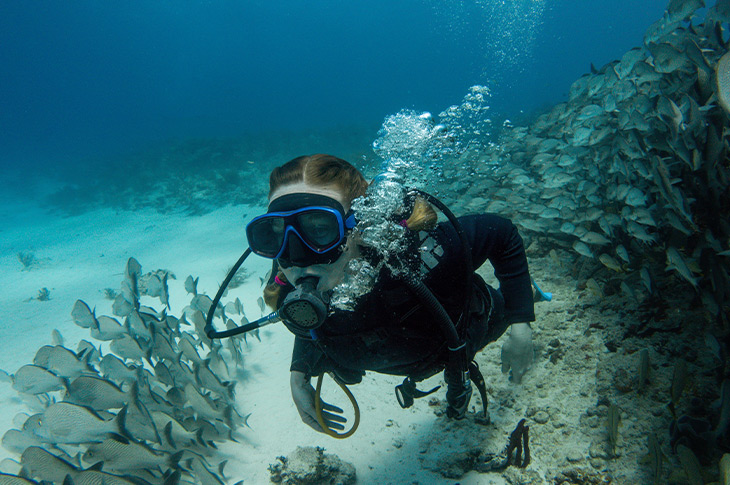How To Conserve Air During Scuba Diving
A diver's nightmare, we've all been there. You must ascend during a spectacular dive and return to the boat, your buddy, or you are running low on air when exploring an intriguing wreck or a charming coral garden.
We all know why being conservative with air is so essential for scuba divers because being modest with air secures prolonged dive times.
Many indicators are contributing to conserving your air consumption. Holding your breath isn't one of them! Wisely breathing contributes to longer bottom times. It's a matter of practice to conserve air during your dives.
Use your snorkel
You can conserve air before diving and not be wasted above the water level. Once rolling backward from the boat, replace your regulator with your snorkel to meet your fellow divers for your descent.
Control your descent
Hold a vertical position with your fins pointing down to reduce water resistance. When you slowly sink, you consume less air. Be guided by the mooring line or experience difficulties with equalizing.
Rhythmical breathing conserves air.
Long steady breaths. Inhaling slowly and deeply and exhaling slowly contributes to air efficiency. Peculiar of note is that it feels like using more air, but it doesn't. Please memorize never to hold your breath since it does not conserve air.
Just relax
Relaxing and slowing down are beneficial to conserving air. You don't need to break Olympic records underwater. Control your movements and hover around, carried by the flow.
Apply correct weights
The application of correct weights contributes to steady buoyancy. You waste too much air when you continuously inflate and deflate, as an inflated BCD increases water resistance. It requires more effort to swim, hence using more air.
Breathing Calmly
The magic of steady breathing; call it 'considerate breathing. Practice great, long, steady breaths. Try to manage to inhale for four and exhale for six. Please remember never to hold your breath to save air.
Keep warm
Keeping warm contributes to the conservation of air. Drinking something hot between two dives works miracles. As unglamorous as it may look, consider wearing a windbreak jack or a hood and gloves during breaks.
No room for complacency
Nothing is embarrassing about checking your gauge regularly. The more comfortable you feel, the more you control your breathing. If you use more air than you would have liked, slightly ascend and be conservative with your movements.
Keep your lungs healthy
You can keep your lungs healthy, of course, by not smoking but also by introducing cardio efforts on a daily base. Brisk walking, biking, and swimming are great contributors to healthier lungs.
Kick in kicking
The frog kick is very welcome to help you maintain your buoyancy. It keeps your body horizontal. Less energy means less air consumption. It's as simple as that!


